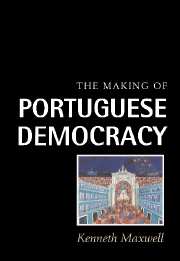Book contents
3 - Coup d'état
Published online by Cambridge University Press: 24 November 2009
Summary
If you fire, it will be civil war. Is the Army going to fire on the Army?
Captain Salgueiro Maia to loyalist tank commanders, Lisbon (April 25, 1974)You must maintain control. I am frightened by the idea of power loose in the street.
Marcello Caetano to General Spínola as he surrendered (April 25, 1974)When the Revolution took place in Portugal the United States had “gone out to lunch.” We were completely surprised.
Cord Meyer, CIA station chief in London (April 1974)The alliance of the people and the military is, in the specific situation existing today, an essential condition for the progress of democratization of Portuguese society.
Alvaro Cunhal (April 1974)As the base of the old regime in Lisbon was being undermined by changing social and economic conditions, and with widespread plotting and dissatisfaction spreading throughout the armed forces from the highest ranks to the junior officers corps, Portugal's NATO partners were blissfully unaware that anything was amiss with their old, docile, and occasionally useful ally.
A major policy review of US relations with southern Africa took place in 1969, early in the administration of Richard Nixon. That summer an interdepartmental group on Africa reported to the National Security Council that “the outlook for the rebellion [in Portuguese Africa] is one of continued stalemate: the rebels cannot oust the Portuguese and the Portuguese can contain but not eliminate the rebels.”
- Type
- Chapter
- Information
- The Making of Portuguese Democracy , pp. 45 - 65Publisher: Cambridge University PressPrint publication year: 1995

